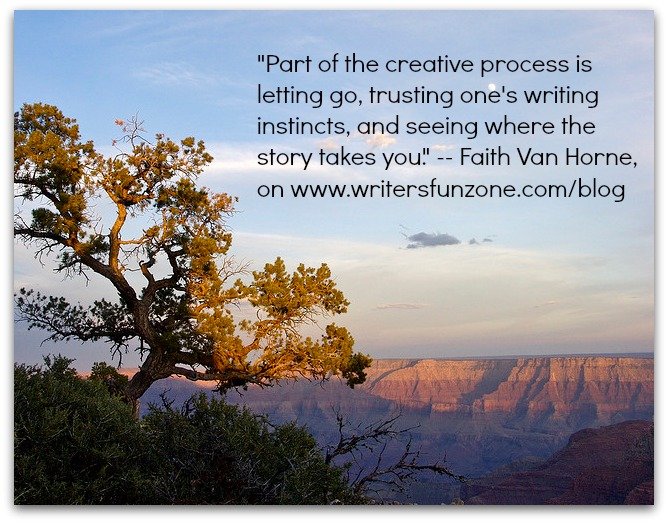Writing and Intuition by Faith Van Horne
 I am happy to welcome Faith Van Horne back for another month with us! In today’s article Faith discusses writing and intuition. Enjoy!
I am happy to welcome Faith Van Horne back for another month with us! In today’s article Faith discusses writing and intuition. Enjoy!
***
Writing advice tends to be divided into two seemingly contrasting camps: “art” vs. “craft.” The craft camp is centered on concrete, nuts, and bolts matters. In writing novels, these include skills like characterization, building a plot, creating more realistic dialogue, and so forth. The art side focuses on the less quantifiable, but equally important, aspects of writing. For myself, writing is an important creative outlet, so expressing myself artistically goes hand in hand with improving my craft.
In reality, however, there isn’t a sharp separation between the two areas of writing. They overlap in many places. For example, while not hard and fast, intuition is an important part of writing.
“Intuition” can carry a sense of abstract mysticism. And while some people have stronger innate instincts, in reality intuition can also be taught as a skill. Martial artists know this well. In “Dojo Wisdom for Writers,” Jennifer Lawler explains:
“Martial artists cultivate their intuition… Maybe it’s just the way a person entering a room looks or smells. Maybe his expression reveals his discontent and anger and the martial artist senses he’s looking for trouble. The wise martial artist slips away and doesn’t oblige.” [Emphasis mine.]
Lawler goes on to make a separate point about writing and intuition, dealing with how writers should trust their hunches about their careers. But intuition plays an important part in how words appear on the page, as well.
The important part of this quote to me is the idea that intuition can be cultivated. In practicing martial arts, one learns to see the signs of conflict emerging. A stiffened stance; speaking in clipped tones; an increasingly closed-off expression. Even if one starts their practice as an oblivious observer, these signs of potential trouble become more easy to spot as one gets trained. Sensing that someone’s about to blow their top isn’t an in-born mystical talent. It’s a skill that can be built.
The same goes for intuition in writing. Regardless of how carefully one might outline a first draft, plotting out character arcs, action and recovery scenes, fiction writing is never so cut and dried. Part of the creative process is letting go, trusting one’s writing instincts, and seeing where the story takes you.
But again, this is a skill that can be taught. A lot of writers develop their intuitive skills through reading loved books. With awareness and practice, one can learn what aspects of an author’s writing transports her into the story. You can get an instinctive sense of a character description that brings the written word out of a line on a page and makes it live within you. This knowledge can then be applied to your own writing.
Try this the next time you’re working on a fresh draft. Before beginning, heighten your awareness. Let the words flow out. And as you write, be mindful of how your words feel to you. Maybe you’re especially aware of the unique aspects of a setting, and a description of the pattern of the rug on the floor brings out a deeper story point. Or an especially cutting line of dialogue sets one character apart. With practice, your intuition can become a powerful guide.
***
 Faith Van Horne is the author of the young adult fantasy novel Slideways. Her collection of offbeat horror stories, Super Sargasso, is now available. She is currently working on another novel. In her free time, she practices karate, and even helps teach it a little. She also blogs at Scribatious (faithvanhorne.
Faith Van Horne is the author of the young adult fantasy novel Slideways. Her collection of offbeat horror stories, Super Sargasso, is now available. She is currently working on another novel. In her free time, she practices karate, and even helps teach it a little. She also blogs at Scribatious (faithvanhorne.






I heard someone say your should write the novel before you write your novel. That way you’ll have a sense of your characters before putting them in dire situations. Then instinctively, you’ll know exactly how they’ll react to the conflict you throw at them. But you are absolutely right, we need to be immersed in the tiny details that make your characters rich. I like the fact that we can build our writer’s instinct. Thanks for your article.
Thanks for responding! I’m curious about what you mean by, “write the novel before you write the novel”. Do you mean a first draft?
Thanks for this, Faith! For me, when I start my writing for the day, it is always a leap of inspiration, of faith, of letting the wildness go and exploring. It is an intuitive search through the shadows to find meaning. That’s what keeps me coming back each morning!
What I did was write my character’s bio like a novel before I started writing the actual one I’ll be working on getting published. In that novel I could do anything I wanted – ignore POV regulations, put in all the “was’s” I wanted to, basically it was back story. Ended up with a book about 48,000 words long. But at the end of that exercise, I knew my characters like I knew my son or my husband – intimately. Now I don’t recommend you do this for your characters, but a character chart wasn’t cutting it for me. So intuitively I knew to do this with only one book. But it has served me well.
[…] Van Horne presents Writing and Intuition posted at Writers Fun […]
That’s very inspring, Wyatt. Thanks for sharing.
I’m always interested to hear others’ approaches, thank you.